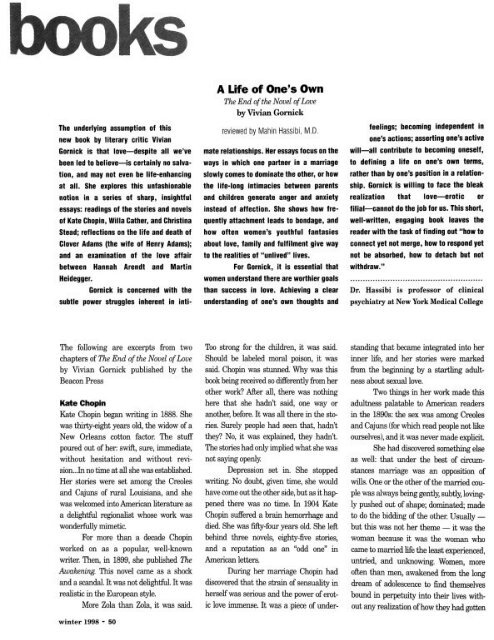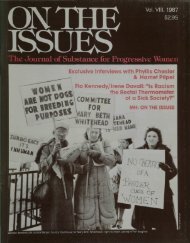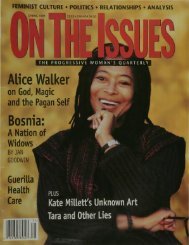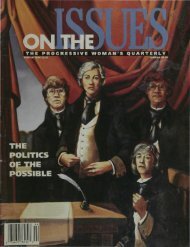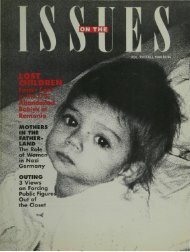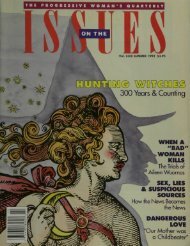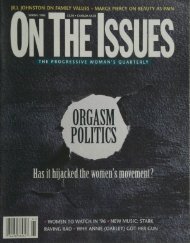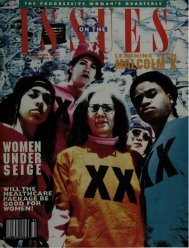women histories, incest sexual abuse. institutionalized. But what if ...
women histories, incest sexual abuse. institutionalized. But what if ...
women histories, incest sexual abuse. institutionalized. But what if ...
You also want an ePaper? Increase the reach of your titles
YUMPU automatically turns print PDFs into web optimized ePapers that Google loves.
Ill<br />
The underlying assumption of this<br />
new book by literary critic Vivian<br />
Gornick is that love—despite all we've<br />
been led to believe—is certainly no salva-<br />
tion, and may not even be l<strong>if</strong>e-enhancing<br />
at all. She explores this unfashionable<br />
notion in a series of sharp, insightful<br />
essays: readings of the stories and novels<br />
of Kate Chopin, Willa Cather, and Christina<br />
Stead; reflections on the l<strong>if</strong>e and death of<br />
Clover Adams (the w<strong>if</strong>e of Henry Adams);<br />
and an examination of the love affair<br />
between Hannah Arendt and Martin<br />
Heidegger.<br />
Gornick is concerned with the<br />
subtle power struggles inherent in inti-<br />
The following are excerpts from two<br />
chapters of The End of the Novel of Love<br />
by Vivian Gornick published by the<br />
Beacon Press<br />
Kate Chopin<br />
Kate Chopin began writing in 1888. She<br />
was thirty-eight years old, the widow of a<br />
New Orleans cotton factor. The stuff<br />
poured out of her: sw<strong>if</strong>t, sure, immediate,<br />
without hesitation and without revision...In<br />
no time at all she was established.<br />
Her stories were set among the Creoles<br />
and Cajuns of rural Louisiana, and she<br />
was welcomed into American literature as<br />
a delightful regionalist whose work was<br />
wonderfully mimetic.<br />
For more than a decade Chopin<br />
worked on as a popular, well-known<br />
writer. Then, in 1899, she published The<br />
Awakening. This novel came as a shock<br />
and a scandal. It was not delightful. It was<br />
realistic in the European style.<br />
More Zola than Zola, it was said.<br />
winter 1998 - 50<br />
A L<strong>if</strong>e of One's Own<br />
The End of the Novel of Love<br />
by Vivian Gornick<br />
reviewed by Mahin Hassibi, M.D.<br />
mate relationships. Her essays focus on the<br />
ways in which one partner in a marriage<br />
slowly comes to dominate the other, or how<br />
the l<strong>if</strong>e-long intimacies between parents<br />
and children generate anger and anxiety<br />
instead of affection. She shows how fre-<br />
quently attachment leads to bondage, and<br />
how often <strong>women</strong>'s youthful fantasies<br />
about love, family and fulfilment give way<br />
to the realities of "unlived" lives.<br />
For Gornick, it is essential that<br />
<strong>women</strong> understand there are worthier goals<br />
than success in love. Achieving a clear<br />
understanding of one's own thoughts and<br />
Too strong for the children, it was said.<br />
Should be labeled moral poison, it was<br />
said. Chopin was stunned. Why was this<br />
book being received so d<strong>if</strong>ferently from her<br />
other work? After all, there was nothing<br />
here that she hadn't said, one way or<br />
another, before. It was all there in the stories.<br />
Surely people had seen that, hadn't<br />
they? No, it was explained, they hadn't.<br />
The stories had only implied <strong>what</strong> she was<br />
not saying openly.<br />
Depression set in. She stopped<br />
writing. No doubt, given time, she would<br />
have come out the other side, but as it happened<br />
there was no time, hi 1904 Kate<br />
Chopin suffered a brain hemorrhage and<br />
died. She was f<strong>if</strong>ty-four years old. She left<br />
behind three novels, eighty-five stories,<br />
and a reputation as an "odd one" in<br />
American letters.<br />
During her marriage Chopin had<br />
discovered that the strain of sensuality in<br />
herself was serious and the power of erotic<br />
love immense. It was a piece of under-<br />
feelings; becoming independent in<br />
one's actions; asserting one's active<br />
will—all contribute to becoming oneself,<br />
to defining a l<strong>if</strong>e on one's own terms,<br />
rather than by one's position in a relation-<br />
ship. Gornick is willing to face the bleak<br />
realization that love—erotic or<br />
filial—cannot do the job for us. This short,<br />
well-written, engaging book leaves the<br />
reader with the task of finding out "how to<br />
connect yet not merge, how to respond yet<br />
not be absorbed, how to detach but not<br />
withdraw."<br />
Dr. Hassibi is professor of clinical<br />
psychiatry at New York Medical College<br />
standing that became integrated into her<br />
inner l<strong>if</strong>e, and her stories were marked<br />
from the beginning by a startling adultness<br />
about <strong>sexual</strong> love.<br />
Two things in her work made this<br />
adultness palatable to American readers<br />
in the 1890s: the sex was among Creoles<br />
and Cajuns (for which read people not like<br />
ourselves), and it was never made explicit.<br />
She had discovered something else<br />
as well: that under the best of circumstances<br />
marriage was an opposition of<br />
wills. One or the other of the married couple<br />
was always being gently, subtly, lovingly<br />
pushed out of shape; dominated; made<br />
to do the bidding of the other. Usually —<br />
but this was not her theme — it was the<br />
woman because it was the woman who<br />
came to married l<strong>if</strong>e the least experienced,<br />
untried, and unknowing. Women, more<br />
often than men, awakened from the long<br />
dream of adolescence to find themselves<br />
bound in perpetuity into their lives without<br />
any realization of how they had gotten


